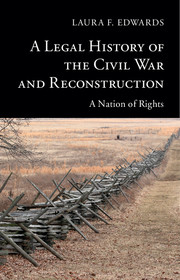Book contents
- Frontmatter
- Dedication
- Contents
- Acknowledgments
- Introduction
- 1 The United States and Its Use of the People
- 2 The Confederacy and Its Legal Contradictions
- 3 Enslaved Americans, Emancipation, and the Future Legal Order
- 4 The Federal Government and the Reconstruction of the Legal Order
- 5 The Possibilities of Rights
- 6 The Power of Law and the Limits of Rights
- Conclusion
- Bibliographic Essay
- Bibliography
- Index
- References
5 - The Possibilities of Rights
Published online by Cambridge University Press: 05 February 2015
- Frontmatter
- Dedication
- Contents
- Acknowledgments
- Introduction
- 1 The United States and Its Use of the People
- 2 The Confederacy and Its Legal Contradictions
- 3 Enslaved Americans, Emancipation, and the Future Legal Order
- 4 The Federal Government and the Reconstruction of the Legal Order
- 5 The Possibilities of Rights
- 6 The Power of Law and the Limits of Rights
- Conclusion
- Bibliographic Essay
- Bibliography
- Index
- References
Summary
Bella Newton was one of many Americans who gave meaning to the broad legal changes put in place by Congressional Republicans. Newton, an African American woman in North Carolina, did not set out to involve herself in the major constitutional questions of the day. She wanted only to defend her children, William and Susan, against the actions of an angry white neighbor, Alexander Noblin. The incident began in the spring of 1869 when William and Susan took a short cut across Noblin’s land on the way home from school. Noblin ordered the children off. From there, the situation deteriorated rapidly. Noblin tried to assault Susan. William threw a rock at Noblin’s head, frustrating his attempt. Then, as the children made their escape, Noblin tried to assert his authority one final time. In William’s words, he “shook his penis at us.” After learning of the incident, Bella Newton’s first response was in keeping with local customs. She publicized her complaint in the neighborhood and then made an informal bargain with Noblin, agreeing to drop the matter in exchange for one dollar and ten pounds of bacon. Noblin delivered on his end of the deal, but Newton had a change of heart and filed charges with the justice of the peace, turning the incident into a legal matter involving her rights and those of her children. Much to his chagrin, Noblin learned that his actions carried different consequences than they had before the enactment of the Reconstruction Amendments: Noblin was indicted for assault at the spring term of the Superior Court.
Congressional Republicans rallied in support of the extension of federal power to bring the states of the former Confederacy in line with what they saw as broad, national principles. But consensus fell apart after that: even within the Republican Party, there was no agreement as to what, exactly, the Reconstruction Amendments were meant to accomplish. Reliance on the compliance of state governments only muddied the waters, dispersing responsibility for enforcing the amendments and, in the process, diluting their meaning.
- Type
- Chapter
- Information
- A Legal History of the Civil War and ReconstructionA Nation of Rights, pp. 120 - 145Publisher: Cambridge University PressPrint publication year: 2015



